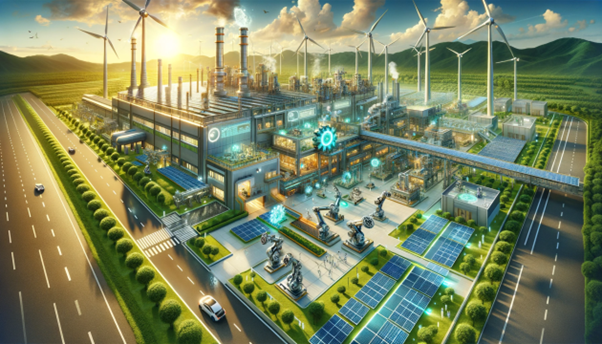How Automation is Driving Sustainable & Green Manufacturing in India
- jyothi8501joseph
- Jan 13
- 3 min read

With India’s industrial sector growing at an unprecedented rate, the need for sustainable and eco-friendly manufacturing has never been more critical. As the country aims for net-zero carbon emissions by 2070, businesses are increasingly adopting automation, AI-driven systems, and smart technologies to enhance efficiency while minimizing environmental impact.
Automation is playing a crucial role in transforming traditional manufacturing into a greener and more resource-efficient process. From reducing energy consumption to optimizing waste management, automation is enabling Indian industries to adopt sustainable practices without compromising productivity.
As we gear up for Automation Expo 2025 in Chennai & Mumbai, lets explores how automation is driving green manufacturing in India, its benefits, challenges, and the future outlook.
1. Energy-Efficient Smart Factories
One of the most significant contributions of automation to sustainability is the rise of smart factories that optimize energy usage, reduce emissions, and improve efficiency.
How Automation Improves Energy Efficiency in Indian Industries:
AI-powered energy monitoring systems analyze real-time energy consumption and optimize processes to reduce waste.
Smart lighting and HVAC (heating, ventilation, and air conditioning) automation help factories reduce electricity consumption.
IoT-enabled sensors detect energy inefficiencies and adjust power usage accordingly.
2. Waste Reduction Through AI & Robotics
Automation significantly reduces industrial waste by ensuring precise material usage, efficient recycling, and better process control.
Ways Automation is Reducing Waste in Indian Manufacturing:
AI-powered quality control reduces defective products, minimizing rework and scrap.
3D printing and additive manufacturing allow material-efficient production, reducing wastage.
Automated sorting systems improve recycling rates in manufacturing plants.
3. Water Conservation with Smart Sensors
The textile, food, and beverage industries in India are among the highest consumers of freshwater resources. Automated water management systems are helping businesses conserve and recycle water, leading to sustainable industrial practices.
Key Technologies Driving Water Conservation:
IoT-based water flow monitoring ensures efficient usage in production plants.
Automated wastewater treatment plants recycle and reuse industrial water.
AI-driven leak detection systems prevent unnecessary water loss.
4. Sustainable Logistics & Supply Chain Automation
India’s booming e-commerce and logistics sector is a major contributor to carbon emissions. Automation is making supply chains more eco-friendly by optimizing transportation routes, reducing fuel consumption, and digitizing operations.
How Automation is Enabling Green Logistics in India:
AI-powered route optimization reduces fuel consumption and emissions.
Automated warehouses with robotics cut down on energy use.
Electric and autonomous delivery vehicles are being adopted to replace diesel-based logistics.
5. Renewable Energy Integration in Manufacturing
With India pushing for solar, wind, and hybrid energy solutions, many factories are integrating automation-driven energy management systems to seamlessly shift between renewable and traditional power sources.
How Smart Energy Automation is Benefiting Indian Industries:
Automated power grids optimize energy distribution between solar, wind, and thermal sources.
AI-powered battery storage management ensures efficient utilization of renewable energy.
Smart factory automation enables real-time switching between conventional and renewable power.
6. Green Building Automation in Industrial Facilities
Factories and industrial units are now adopting smart building automation to create energy-efficient and eco-friendly workspaces.
How Smart Buildings are Supporting Green Manufacturing:
IoT-based energy monitoring reduces power wastage in industrial units.
Automated HVAC systems optimize heating and cooling for energy savings.
Smart water management minimizes wastage in large industrial plants.
7. Robotics in E-Waste Management
As India becomes a global hub for electronics manufacturing, electronic waste (e-waste) is a growing challenge. Automated recycling systems are helping in the efficient breakdown and recycling of electronic components.
How Robotics & AI are Transforming E-Waste Recycling:
AI-powered robotic arms can sort, dismantle, and recycle e-waste efficiently.
Machine learning algorithms identify valuable components for reuse.
Automated waste segregation systems improve recycling rates.
Challenges in Implementing Sustainable Automation in India
Despite its benefits, green manufacturing automation in India faces some key challenges:
High Initial Costs – Automation technology requires significant investment, making it difficult for SMEs to adopt.
Lack of Skilled Workforce – The need for AI, IoT, and robotics experts is growing, but training is still limited.
Infrastructure Limitations – Many older industrial units require major upgrades before implementing automation.
Data Security Concerns – Automation-driven smart factories generate massive amounts of data, requiring advanced cybersecurity measures.
How India is Overcoming These Challenges:
Government programs like “Make in India” and “Digital India” are promoting automation adoption.
More affordable automation solutions are being developed for SMEs.
Training programs and reskilling initiatives are being implemented to bridge the skills gap.
Future of Sustainable Automation in India
With increasing emphasis on ESG (Environmental, Social, and Governance) standards, Indian industries are expected to:
Adopt AI-driven carbon footprint tracking systems.
Expand use of solar and wind-powered smart factories.
Develop 100% automated zero-waste manufacturing plants.
Invest in biodegradable and recyclable automation components.
Automation Expo 2025 in Chennai & Mumbai will showcase the latest innovations in sustainable industrial automation, providing valuable insights for businesses looking to adopt eco-friendly practices.
.png)
Comments